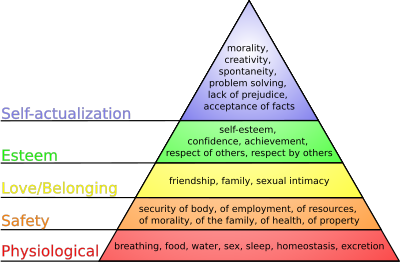Your quota of worry and how to shrink it
Sometimes I think we all have a worrying quota. An amount of worry we feel compelling to apply to the world. And if our lives get safe, and there isn’t much really worth worrying about, we fill up our quota by worrying about things that don’t really matter much at all. Experts call this chronic stress, an ongoing negative response to small negative events in life, not big ones like divorce or losing a job. And we develop habits that keep that chronic stress level high for no good reason.
Case in point: I had a deep, worried conversation with my brother about the criteria for accepting Facebook invites from people who were jerks 25 years ago when we went to grade school with them. Boy – do we need other things to fill our quotas of worry. Like the Facebook example, I catch myself worrying about ridiculous, trivial things now and then, and the trick that helps, that shrinks my worrying quota is Maslows hierarchy of needs.

It’s an old trick: put whatever is on your mind in some kind of perspective (What’s worse? What’s better?) and it loses its venom. Most of the time, whatever I’m worrying about scores on the top half of the pyramid, and while it might belong in my quota of worry, it certainly doesn’t deserve the amount of energy from my life it’s absorbing.
Sometimes decisions are so insignificant that simply flipping a coin to decide and getting the decision out of the way is the best and healthiest thing all around: neither end of the decision matters. The only bad choice is taking too much time to make one. I find I can shrink my quota of worry by deciding a) some decisions matter less than I think b) worrying won’t help me make a better decision c) get someone else to sanity check if I’m worrying too much about something.
How do you find ways to worry less about things that aren’t worth worrying about?
References:
- My favorite book on meditation: Turning The Mind Into An Ally
- Alan Watts on Worry and Compulsive Thinking
(While I’m a fan of Maslow’s, anyone know of interesting alternative hierarchies of needs?)
[Updated with new link on stress 12/11/14]

Wow, powerful point. So true.
Some people use the system of the 7 major chakras as a hierarchy for personal development. The theory is that you focus on the attributes represented by each successive chakra as you mature. It has some interesting parallels to Maslow’s hierarchy – especially intriguing since it evolved separately from Western psychological theory.
#1 Root chakra: survival instincts, basic biological needs
#2 Sacral chakra: basic emotional needs and sexual impulses
#3 Solar plexus chakra: personal power, fear & anxiety
#4 Heart chakra: love, compassion, tenderness
#5 Throat chakra: communication, growth through expression
#6 Brow chakra: balancing higher and lower selves, intuition
#7 Crown chakra: pure consciousness and spirituality
Partially borrowed from http://en.wikipedia.org/wiki/Chakras#The_Seven_Major_Chakras.
I find it helps to ask: do I have to worry about now? If happens, am I confident I’ll be able to deal with it then and there? Works both for personal concerns, and when I’m working with software teams spending too much time talking.
David
I work at a Hospital. You get a pretty good
perspective of what is important when you see what I see everyday.
I think that you are right; people worry about
silly things when they don’t have anything
better to do.
For me, the key is to keep it simple.
“Suffering is caused by craving or attachments to worldly pleasures of all kinds”.
F.
Good post, Scott. Interesting for me to reflect on some friends of mine who seem to be stuck at the lower levels of the Maslovian hierarchy AND display a marked inability to take decisions AND worry much more than I could stand. Worth pondering the connections between these things — thanks for setting those wheels of thought in motion.
One of the best ways to make some difficult decisions is by flipping a coin.
Consider a decision that seems a 50/50 proposition, one you’ve agonized over. You’ve gone back and forth a dozen times. Either outcome has value, and either has pain.
Flip a coin. Be clear about which outcome is Heads and which is Tails.
Flip the coin high. While it is in the air, you’ll know which way you hope it falls.
[Disclaimer: This is not legal, medical, or moral advice. This method is so totally not suitable for decisions involving relationships, in part because any attempt to explain your decision will terminate the relationship on the spot.]
I see this is a really old post, but I’d still like to leave my thoughts. When I’m very worried I try to stop and ask myself: What is the worst that could happen? I slow down and look at it. If the worst did happen, what actions would that lead to? Then I know I have a plan, I know I would be able to face it, and I can move forward.
When I’m worried, I stop being worried and be awesome instead ! True story !